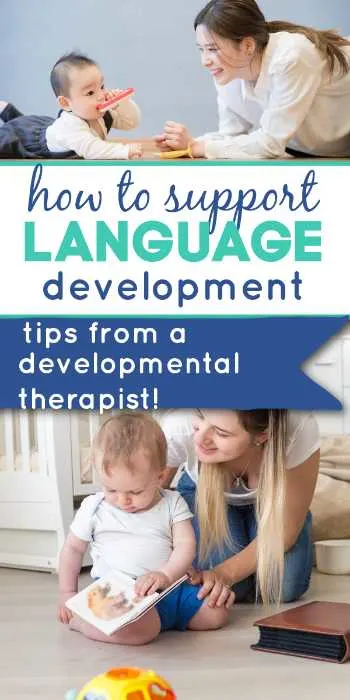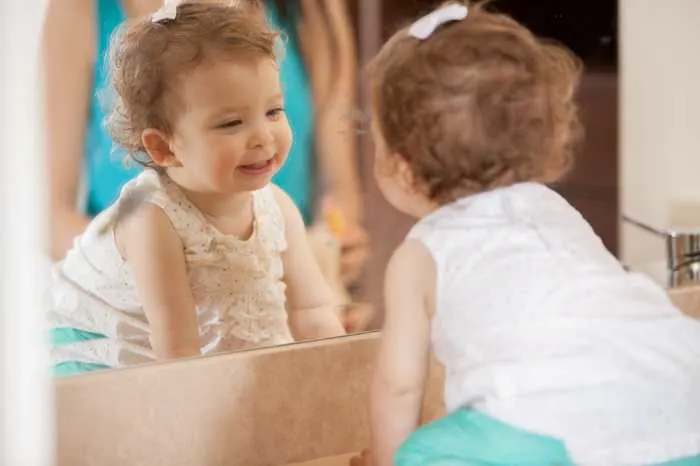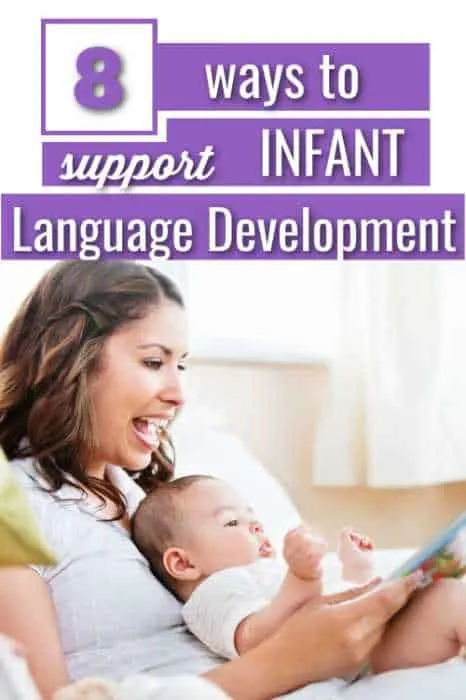
(This post may contain affiliate links. To read our full disclosure policy click here.)
As you know, babies develop new skills every day.
And one of the most important skills they need to learn is how to communicate with others through language.
You can help your child on their path to communication by talking to them as often as possible, reading books together every day, and providing plenty of opportunities for exploration and learning.
In this blog post, we will give you simple ideas on how to support language development that you can start doing today!
These are some of my favorite strategies that I have used with families while working in early intervention as a Developmental Therapist as well as have used them at home with my own kiddos!
1. Talk To Your Baby As Often As Possible
One of the best ways to support infant language development is by just talking to your little one.
I know this seems so simple but your little one needs to hear words over and over again before they start to understand them and before they try to imitate them.
So always talk to your baby and make it a point every day to keep the conversation going.
You can do this by commenting or narrating as you go about your daily routines.
Saying things like “I need to find a diaper so that we can change yours.”

2. Read Everyday with Your Baby
Sitting down every day to read with your little one is another way you can support their language development.
Reading books should be an everyday activity for you and your infant that happens first thing in the morning, during the day, and before bedtime!
Choose a time that works best for you, and work it into your routine so that you are consistent.
Reading to your little one supports your child’s development in many different ways as it encourages cognitive skills as they process the information and fine motor development as they learn to touch and feel the pages.
Every time you turn a page of the book, describe to your baby what you see.
If they allow, you can also gentle take their hand and encourage them to touch the pages.
Know that if your baby tried to put the book in their mouth…this is normal!
Make sure to pick books that are safe and developmentally appropriate for where your little one is at.
You can get some ideas on some baby books here.
3. Sing Songs and Fingerplays
Singing songs and fingerplays is a great activity to support expressive language because many babies find it so fun and interesting!
The repetitive nature of songs allows your little one to hear the same words over and over again making them easier for them to pick up.
It is also a great way for you and your little one to bond!
You can sing songs to your little one while you are going about the house, in the car, or giving them a bath.
4. Making Sounds with Your Baby
Make time for conversations with your baby throughout the day.
When babies begin to make their first sounds we can start responding to them so that they know that we see and hear them.
You can do this by saying actual words or even playing a simple game like imitating back the speech sounds that they make.
For more simple ideas on how to your child’s language skills make sure to check out my 0-12 Month 1 MInute Communication Idea cards.

5. Mirror Play to Encourage Imitation
Babies love to look at their reflections!
Using your bathroom mirror or an unbreakable mirror like this can be a fun way to work on sounds, gestures, and first words.
Observe how your baby reacts to the mirror, are they interested?
Model for your baby how to wave “bye bye” or make animal sounds.
This way they can see what their face and mouth does while they are learning to talk.
6. Independent Play Time
I know we have been talking a lot about ways for you to model real words to help your baby learn language but it is also important to balance it out with times where they explore sounds, babble, and talk on their own without any input from us.
This is called independent playtime.
It gives your little one an opportunity to have fun and express themselves through language, learn about how their voice sounds, develop fine motor skills by manipulating toys, and feel secure as they are learning on their own.
Of course, you will still want to supervise your baby to make sure that they are safe, so play the role of the observer instead of interacting with them as they play independently.

7. Use Choices
Using a choice with your baby is a wonderful low-pressure strategy that we can use throughout the day.
Give your baby choices such as “do you want to wear the red shirt or the yellow one?”
Watch for their cues!
Do their eyes gaze at one option? Will they point to what they want?
Using these forms of communication help your little one express their needs and wants even before their first words.
When you do this you are helping them begin to understand that words can be used to communicate.
This is a great way for them to explore their vocabulary and language structure!
8. Pair Gestures with Words
Using baby signs or gestures is another tool used to support speech and language development.
Babies will usually be able to imitate gestures before they can say any words.
By pairing gestures with their corresponding word, you are helping your baby learn to communicate in a way that is easier for them at this stage.
Here are some baby signs you can start with.
Use these simple strategies and have fun!
It is important to support your infant’s language development in a variety of ways.
You can start by talking to them, reading to them, and providing plenty of opportunities for exploration and learning.
Singing songs and fingerplays is also a great way to help your child learn language skills.
Babies love looking at their reflections in mirrors, so using mirrors can be a fun way to work on sounds, gestures, and first words with your little one.
Independent playtime is essential for a baby’s language development; it gives them an opportunity to explore sounds, babble, and talk on their own without any input from us.
Using choices is another low-pressure strategy that we can use throughout the day to help our babies communicate what they want or need.
For more ideas make sure to check out my 1 Minute Communication Idea Cards or get all of my resources in my Mindful Parents of Babies and Toddlers Community!
Are you concerned about language development milestones?
If you have concerns about your child’s language milestones (you can read more about them here) make sure to discuss them with your pediatrician or give early intervention a call for a free screening or evaluation.
Should I have a hearing test done?
Most babies will have at least a newborn hearing screening completed at birth. However, you can also ask your pediatrician if you would like another one completed.
Frequently Asked Questions About Baby Talk
Babies are very observant and are watching their caregivers all day long! Many skills they will get just from being around us. They also learn through play, reading books, and singing.
How do infants communicate their needs?
Your baby may not have any words yet they are excellent communicators!
Watch your baby’s cues such as their facial expressions, sounds, gestures, and body language to figure out what they need or want.
For example, your baby may start to get squirmy to indicate they need a diaper change.
They also communicate through their cries. You may also notice that their cry sounds a bit different depending on what they need.
We usually break it down into two types.
Expressive language development refers to how your baby communicates their wants and needs while receptive language skills is referring to your child understanding words and simple commands.
Related Posts You Will Enjoy
How to Find the Best Crawling Mat for Your Baby
When do babies start holding their own bottles?
Are Activity Tables Good for Babies?
Simple Ways to Play with Your Newborn


Kayla O’Neill has a master’s degree in education as well as a bachelor’s degree in special education with an emphasis in early childhood education. She has been working as a developmental therapist with babies and toddlers in early intervention since 2012. She is also a mom with two young children.